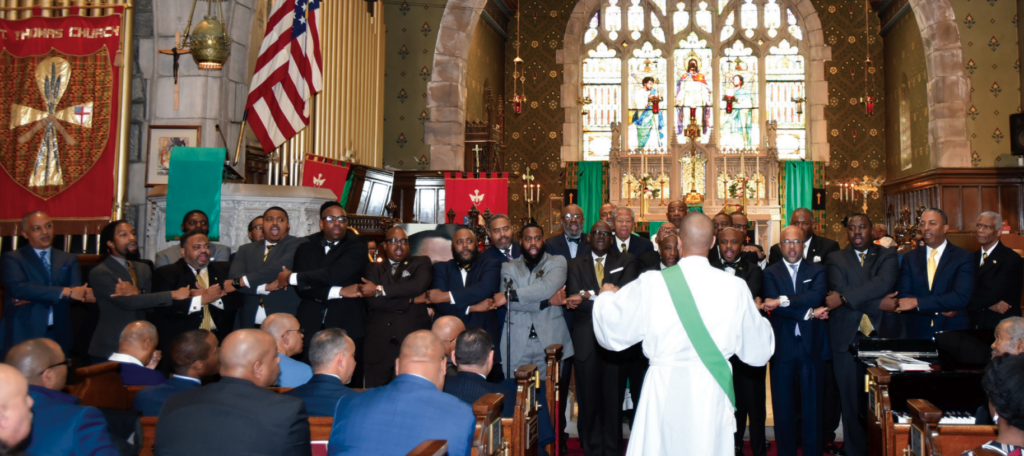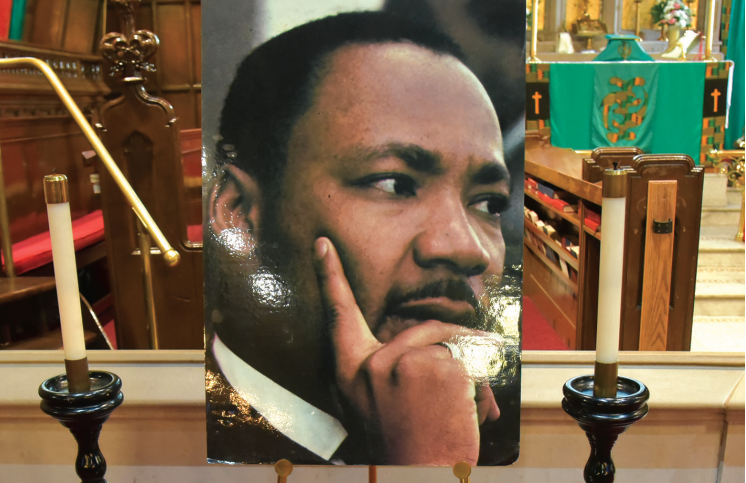Today, January 15, 2025, marks Martin Luther King Jr.’s 96th birthday. In memory of the great civil rights leader, we post an abbreviated version of a sermon Dr. Gregory Vincent gave in 2020. The remarks remain significant in 2025 as we move forward in an uncertain world. One of King’s most salient messages, “Letter from the Birmingham Jail,” reminds us that some of the greatest atrocities in human history have occurred under the letter of the law; that there are just and unjust laws. He also cautioned us that injustice anywhere is a threat to injustice everywhere.
Dr. Vincent reminds us to face these challenging times by living in the present—even when it seems we may be taking a step back, Dr. King taught us that progress is eternal and however long the arc, it bends toward justice.
 On such a glorious Sunday morning, I am grateful for the opportunity to join all of you as we celebrate the life and legacy of the Reverend Dr. Martin Luther King, Jr. This occasion is not one I take lightly. First of all, as the first African Episcopal Church, founded by Absalom Jones and Richard Allen, St. Thomas stands iconic in this nation and in our faith. It was the church the founders of our esteemed fraternity, Sigma Pi Phi, attended. It was the church that led to the founding of my home church, St. Philip’s Episcopal Church in Harlem.
On such a glorious Sunday morning, I am grateful for the opportunity to join all of you as we celebrate the life and legacy of the Reverend Dr. Martin Luther King, Jr. This occasion is not one I take lightly. First of all, as the first African Episcopal Church, founded by Absalom Jones and Richard Allen, St. Thomas stands iconic in this nation and in our faith. It was the church the founders of our esteemed fraternity, Sigma Pi Phi, attended. It was the church that led to the founding of my home church, St. Philip’s Episcopal Church in Harlem.
When I was a child, Dr. King was one of my heroes, and he remains so to this day. At St. Philip’s and at home in New York City, my family lived under two golden rules – respect for others and love for thy neighbor. To see all that Dr. King was able to achieve, with God as his witness, using little more than these two rules, was mystifying to me as a child.
At my graduation from Hobart and William Smith Colleges, the president and dean presented me with the MLK Leadership Award. I was initially thrilled by the honor, but then felt uncomfortable accepting it, as I didn’t feel I had done enough to deserve it. The memory of filling out law school applications is still clear in my mind: I was so overcome by emotion that I almost included these feelings in my personal statement. In the end I had a moment of clarity which I have followed since that day. I made a promise to myself that I would devote my life and career to serving others and fighting for justice to honor Dr. King and all those who made my accomplishments possible.
This Sunday we look to the word – both written and spoken – of Dr. King. Of course, Dr. King’s compelling message was always divinely inspired by God. Before I begin, I want to share with all of you a favorite quote of Dr. King’s, one which will frame the remainder my remarks: “We must accept finite disappointment, but never lose infinite hope.” I have always used this quote to ground myself when I am feeling especially down or lost, which, given the climate in our nation currently, is more frequent for all of us. Dr. King was always one who understood the dichotomy of life and could phrase it in ways that all could easily understand. This is also true of most of his noteworthy works, two of which I was drawn to in preparation for this occasion.

The first is the renowned Letter from a Birmingham Jail. It was written in shorthand by Dr. King as he sat in prison after being arrested for gathering without a permit on Good Friday in April 1963. Let there be no doubt that Dr. King broke the law, and for that there were consequences, but as he so eloquently stated in his Letter, there are just and unjust laws. Some of the greatest atrocities in human history have occurred under the letter of the law, with slavery at the top of that list along with Jim Crow and state-sponsored racial segregation.
This past year, with a delegation from the NAACP for the Year of Return – a Trip to Ghana 2019, I was again reminded that the most heinous acts committed against our people were supported by both law and Christianity. I felt the pain of our ancestors as I stood, in Ghana, in the slave dungeons, where right above there was a church. I felt their despair when I stood in the river where our brothers and sisters bathed before they embarked on the deadly Middle Passage. Since 1619 our ancestors endured unspeakable indignities and horrors in the name of commerce that were justified by a bankrupt practice of religion.
And Dr. King reminds us, the law itself is not inherently just. What is legal is not always just. Dr. King leveraged his personal discomfort, his finite disappointment, to respond to those who labeled him an outside agitator and to raise awareness that it is our collective responsibility to stand up to prejudice wherever it may occur. In his beautiful prose, he wrote, “I am cognizant of the interrelatedness of all communities and states. I cannot sit idly by in Atlanta and not be concerned about what happens in Birmingham. Injustice anywhere is a threat to justice everywhere.”
Injustice anywhere is a threat to justice everywhere. It’s this message – a refusal to be patient or accept the status quo that I find most meaningful given our current state of affairs. Although predestined by God, our freedom was not granted voluntarily. Progress is and never was inevitable, but comes as a result of the tireless work of men and women who follow God and His justness. For as we find in Lamentations 5:5, we may be weary, but there can be no rest for us. A sobering thought indeed.
But all is not lost, for as Dr. King wrote, “In some not too distant tomorrow the radiant stars of love and brotherhood will shine over our great nation with all their scintillating beauty.” In the depths of that Birmingham jail, Dr. King isolates his disappointment, so that infinite hope may reign supreme.
The second piece emanates from some five years later as Dr. King stood at the pulpit in Memphis before the congregation at the Church of God in Christ to deliver a fiery sermon in April 1968. The world was a much different place from the one King inhabited in his Birmingham jail cell. President Kennedy had been assassinated, the Civil Rights Act of 1964 and the Voting Rights Act of 1965 had been passed. The country fell deeper into war, one that King would speak out against for destroying “the deepest hopes of men the world over.” The nation would witness the depths of racism on “Bloody Sunday,” and two weeks later the power of nonviolent demonstration in the crossing of the Edmund Pettus Bridge on the way to Montgomery. Civil rights icon and American hero U.S. Congressman John Lewis was beaten to within an inch of his life on that bridge. He didn’t just talk, he literally walked the walk.
But more than anything else, in those five years the world had grown tired. Support for Dr. King’s nonviolent message was waning. Yet on this night you would have not known that. Joined by his closest confidant, the Rev. Ralph Abernathy, an ever-optimistic Dr. King still saw only greatness on the horizon.
He began by recounting a conversation he had had with the Creator. Standing at the precipice of eternity, God asked him in which age would he like to live. God offered him his choosing, from ancient Greece to the days of Lincoln, even the Promised Land itself, yet Dr. King turned him down. “If you allow me to live just a few years in the second half of the twentieth century, I will be happy,” he said. For “only when it is dark enough, can you see the stars.” It was the will of God, working in mysterious ways as people across the globe cried for freedom that he could not live without. “We want to be free,” he told God.
I have read this sermon many times before, but its impact has never been greater than now. There are challenging times on the horizon, and the world may not be the place we thought it was just a few years ago. But I hope that we would all make the same decision that Dr. King made more than fifty years ago – to live in the present. While it may seem as though we are taking a step back, progress is eternal, and as Dr. King taught us all, however long the arc, it undoubtedly bends toward justice.
Like Dr. King, I consider myself an eternal optimist – I refuse to allow any displeasure to overcome my hopefulness. But the direction of the country, where I see more and more of us drawing ourselves into our prospective corners based primarily on belief and ideology, has me worried. Every morning I wake up early to have time to myself. It’s generally a private, quiet time, where I catch up on the day ahead. I use this time for prayer, followed by reading anything and everything that’s come out since I went to bed – mainly news and commentary, both that with which I agree and then that with which I may vehemently disagree. I do this because I’m forever in search of the truth, and knowing what the other side thinks provides me with a differing point of view that helps to sharpen my own arguments.
But I fear our collective desire for rational inquiry and our search for absolute truth is dissipating. The rise of “fake news” should deeply trouble all of us. Although it has never been easier to surround yourself with like-minded opinions, I ask that you fight this urge. Standing up for what we believe in does not mean compromising our intellect. I have always believed that it is through debate that we develop our strongest arguments.
In closing his sermon, Dr. King proclaimed that he had been to the top of the mountain and peered over its edge. “I’ve seen the Promised Land. I may not get there with you. But I want you to know tonight, that we, as a people will get to the Promised Land.” The very next day, Dr. King would meet our Creator in heaven from the bullet of a domestic terrorist. But on that night, Dr. King confessed to being happy and without worry, for his eyes had “seen the glory of the coming of the Lord.”
As we celebrate the ninety-first anniversary of Dr. King’s life, please continue to build relationships that bridge our divides. It is more crucial than ever that we continue to work toward finding the commonalities among those with whom we might otherwise disagree. Nelson Mandela, who spent twenty-seven years in prison because of his work against apartheid has reminded us, much as King has, “No one is born hating another person because of the color of his skin, or his background, or his religion. . . if we can learn to hate, then we can be taught to love, because love comes more naturally to the human heart than its opposite.” This is at the heart of racial reconciliation, which we so desperately need in this time when white supremacy and accompanying domestic terrorism are still a reality.
I encourage you to do whatever you can to advocate for those most in need, just as Dr. King did, just as Mandela did. In Zechariah 4:10 we are told, “Do not despise these small beginnings, for the LORD rejoices to see the work begin.” Thank you all for your graciousness. Please do not be cynical, but find your infinite hope, continue to fight for all that you believe in and carry that message to someone who might otherwise not hear it. In the wake of tragedy, depravity and injustice, our people continue to carve out a place of beauty and brilliance that will forever shine.

